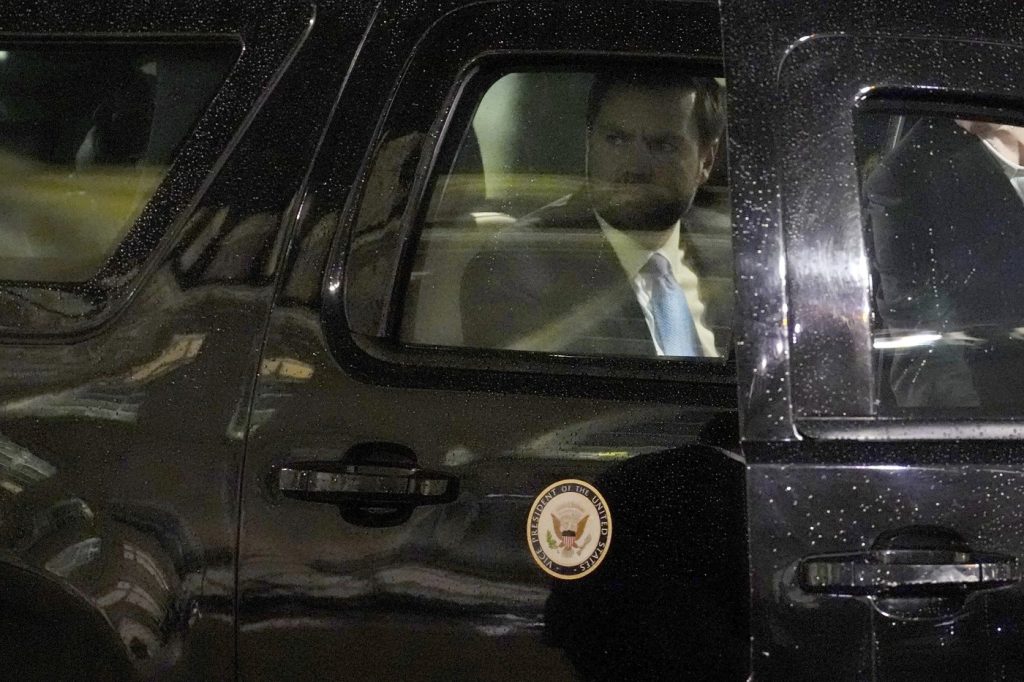PARIS (AP) – JD Vance is set to deliver a keynote speech on Tuesday, the final day of the Paris AI Summit. This marks Vance’s first foreign trip since he took office as vice president. His address is anticipated to challenge Europe’s regulatory approach to artificial intelligence and its content moderation practices on major tech platforms. It emphasizes the growing divergence between the United States and its allies regarding AI governance.
The summit has attracted world leaders, leading tech executives, and policymakers to discuss AI's implications for security, economics, and governance. During the discussions, clear distinctions in AI strategies among various regions were evident. Europe aims to regulate and invest in AI, China is expanding access through state-supported tech companies, while the U.S. under President Donald Trump maintains a hands-off approach.
A notable attendee is Chinese Vice Premier Zhang Guoqing, highlighting Beijing’s interest in influencing global AI standards. Vance has previously criticized European content moderation policies, suggesting that the U.S. should reassess its NATO commitments if European governments enforce restrictions on Elon Musk’s social media platform, X. His visit to Paris is also expected to include discussions on Ukraine, the shifting global power dynamics influenced by AI, and the ongoing tensions between the U.S. and China.
Concerns about the potential dangers of AI have overshadowed the summit, particularly as nations contemplate how to regulate a technology increasingly intertwined with defense and warfare. Admiral Pierre Vandier, NATO's commander overseeing modernization efforts, remarked, “I think one day we will have to find ways to control AI or else we will lose control of everything.”
In addition to addressing diplomatic tensions, a new global public-private partnership named “Current AI” is being established to support large-scale AI initiatives for public welfare. Analysts view this initiative as an opportunity to mitigate the dominance of private companies in the AI sphere. However, uncertainty remains regarding the U.S. involvement in such efforts.
Meanwhile, a fierce competition for AI dominance is intensifying in the private sector. A group of investors led by Musk, who now heads Trump’s Department of Government Efficiency, has proposed a $97.4 billion bid to acquire the nonprofit behind OpenAI. The CEO of OpenAI, Sam Altman, who is present at the Paris summit, has swiftly declined the offer on X.
In a reflection of the growing rivalry between the U.S. and China, Chinese officials on Monday condemned Western attempts to restrict access to AI tools. This stance comes as calls in the U.S. Congress to limit the use of a new AI chatbot developed by Chinese company DeepSeek arise due to security concerns. China advocates for open-source AI, arguing that increased access will benefit global society.
French organizers of the summit hope to attract greater investment in Europe’s AI sector, positioning the region as a serious contender in an industry dominated by U.S. and Chinese competition. French President Emmanuel Macron addressed the energy needs of AI, contrasting France’s nuclear-powered approach with the U.S. reliance on fossil fuels, quipping that France won’t “drill, baby, drill,” but “plug, baby, plug.”
Following his visit to Paris, Vance's diplomatic tour will continue in Germany, where he is scheduled to attend the Munich Security Conference. During this trip, he will encourage European allies to bolster their commitments to NATO and Ukraine, meeting with figures including Ukrainian President Volodymyr Zelenskyy.
Additionally, Vance plans to engage in discussions about Ukraine and the Middle East during a working lunch with Macron. Echoing sentiments from Trump, he has voiced skepticism towards U.S. aid to Kyiv and the broader Western strategy regarding Russia. Vance is also set to hold separate meetings with Indian Prime Minister Narendra Modi and European Commission President Ursula von der Leyen.










